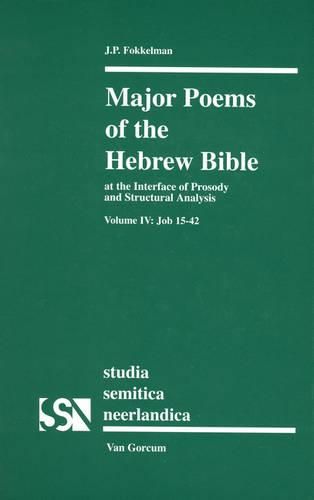Readings Newsletter
Become a Readings Member to make your shopping experience even easier.
Sign in or sign up for free!
You’re not far away from qualifying for FREE standard shipping within Australia
You’ve qualified for FREE standard shipping within Australia
The cart is loading…






The Book of Job contains the only sustained, through-composed work in verse in the Hebrew Bible. This makes it very suitable as a testing area for the rules of verse structure and all other aspects of prosody that were developed in Major Poems of the Hebrew Bible Vol. II and are now also available in Reading Biblical Poetry. This fourth and last volume completes the study that in Vol. I started with Job 3 (curses and complaint), and continued with the first round of the debate (chs.4-14) in Vol. II. Again, the analysis follows two separate circuits: on the one hand that of language, style and structure, on the other hand that of measuring proportions on at least five textual levels. The poetry section of the Book of Job contains 412 strophes, of which the protagonist Job speaks exactly half. His portion of 206 strophes is also divided into equal halves: in 103 short and 103 long strophes. Even more than in the Psalms, the norm figures 7, 8 and 9 play an essential part in the composition of the poems and their average number of syllables per colon. The forty poems of the book exhibit various forms of numerical perfection, and the correct demarcation of strophes and stanzas is found to considerably improve and expand our understanding of its contents.
$9.00 standard shipping within Australia
FREE standard shipping within Australia for orders over $100.00
Express & International shipping calculated at checkout
The Book of Job contains the only sustained, through-composed work in verse in the Hebrew Bible. This makes it very suitable as a testing area for the rules of verse structure and all other aspects of prosody that were developed in Major Poems of the Hebrew Bible Vol. II and are now also available in Reading Biblical Poetry. This fourth and last volume completes the study that in Vol. I started with Job 3 (curses and complaint), and continued with the first round of the debate (chs.4-14) in Vol. II. Again, the analysis follows two separate circuits: on the one hand that of language, style and structure, on the other hand that of measuring proportions on at least five textual levels. The poetry section of the Book of Job contains 412 strophes, of which the protagonist Job speaks exactly half. His portion of 206 strophes is also divided into equal halves: in 103 short and 103 long strophes. Even more than in the Psalms, the norm figures 7, 8 and 9 play an essential part in the composition of the poems and their average number of syllables per colon. The forty poems of the book exhibit various forms of numerical perfection, and the correct demarcation of strophes and stanzas is found to considerably improve and expand our understanding of its contents.